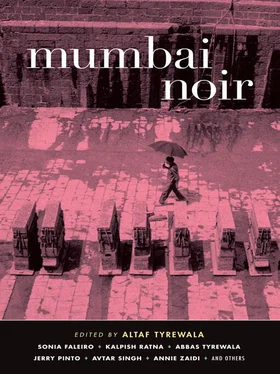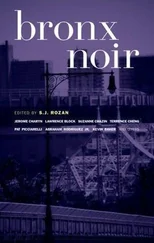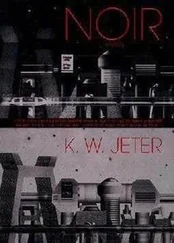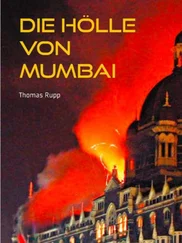Altaf Tyrewala - Mumbai Noir
Здесь есть возможность читать онлайн «Altaf Tyrewala - Mumbai Noir» весь текст электронной книги совершенно бесплатно (целиком полную версию без сокращений). В некоторых случаях можно слушать аудио, скачать через торрент в формате fb2 и присутствует краткое содержание. Год выпуска: 2012, Издательство: akashic books, Жанр: Крутой детектив, на английском языке. Описание произведения, (предисловие) а так же отзывы посетителей доступны на портале библиотеки ЛибКат.
- Название:Mumbai Noir
- Автор:
- Издательство:akashic books
- Жанр:
- Год:2012
- ISBN:нет данных
- Рейтинг книги:5 / 5. Голосов: 1
-
Избранное:Добавить в избранное
- Отзывы:
-
Ваша оценка:
- 100
- 1
- 2
- 3
- 4
- 5
Mumbai Noir: краткое содержание, описание и аннотация
Предлагаем к чтению аннотацию, описание, краткое содержание или предисловие (зависит от того, что написал сам автор книги «Mumbai Noir»). Если вы не нашли необходимую информацию о книге — напишите в комментариях, мы постараемся отыскать её.
Mumbai Noir — читать онлайн бесплатно полную книгу (весь текст) целиком
Ниже представлен текст книги, разбитый по страницам. Система сохранения места последней прочитанной страницы, позволяет с удобством читать онлайн бесплатно книгу «Mumbai Noir», без необходимости каждый раз заново искать на чём Вы остановились. Поставьте закладку, и сможете в любой момент перейти на страницу, на которой закончили чтение.
Интервал:
Закладка:
Altaf Tyrewala
Mumbai, India
December 2011
PART I
BOMB-AY
JUSTICE
BY RIAZ MULLA
Mahim Durgah
The court will now pronounce its verdict,” the judge remarked plainly, as if he was going to read out the evening news.
Asghar Khan stood up in the witness box with the anticipation of a man in that twilight zone of hope when the decision has been made but not yet announced.
“The defendant has been accused of planting a bomb in the crowded Zaveri Bazaar area which killed three people and injured many.”
Asghar Khan wondered whether it was necessary to revisit the circumstances; does a doctor open the incision to check if the surgery has healed?
“The court has been convinced that there was no motive behind this dastardly act but to kill innocent people and create terror.”
The night came alive for Asghar and even today it seemed as unreal as it had seven years ago. He had watched terrorized from his hideout on the terrace as the distant sounds grew louder and the street was suddenly filled with a multitude of swords, tridents, and flames. The group first torched his scooter and in the light of the fire he could see them — known faces made grotesque by the flames. He had bought the scooter secondhand for twelve thousand rupees, the first vehicle of his life. As the tires and seat went up in flames, the mob broke open the shutter of his small travel agency office, Haafiz Tours and Travels. An enterprising insurance agent had once told him to get everything insured; but how does one insure against the betrayal of friends? They unplugged the phone and flung it to the ground and started to ransack his cupboards, throwing everything they could lay their hands on into a huge pile in the middle — passports and airline tickets and application papers — and he realized they were not just going to burn his office but also the small business he had successfully managed to set up. None of his clients at his budding Haj and Umrah travel agency would be able to perform pilgrimage that year; some, like his parents, probably never.
“The court finds Asghar guilty of willful murder and damage to public property.”
The passports, due to their glazed cardboard, were the last to catch fire and burned the longest. That night he wasn’t worried about the scooter or his business; one doesn’t worry about the future when the present itself is under threat. He was worried for his life and Salma’s and their first child still in her womb. She had tried to scream when they poured kerosene on the scooter. She had saved passionately for it and like every woman she was not good at taking losses. He had clasped her mouth firmly and tiny droplets of blood appeared on his palms where she bit him. She had probably realized that the present is of little significance if there is no future to look forward to.
“The court understands that Asghar suffered losses to his business and property in the riots preceding this incident.”
How does one understand something one has never experienced? Even he had not understood when they first came asking for money to fight for the homeless Palestinians. After that night, when he had lost everything, they became his new friends, the only people to lend him money to buy food and treat his wife. He had asked for tickets to go back to his village in far away Uttar Pradesh, where his brothers set up grocery tents in open markets, moving to a different village each day — Dariyapur on Mondays and Thursdays, Rahimgunj on Tuesdays and Fridays, Bidwai on Wednesdays and Saturdays, and their own village on Sundays. He had tired of setting up and closing down a business each day in a new place and had come to Mumbai in search of stability. What he had never thought of was what happens when the thing that brought this stability is suddenly taken away. It was not as easy as setting up a new tent in a new village the next day and he felt a sudden longing to return to that varying yet familiar routine. His new friends, though, refused him that getaway; he had business to settle in the city before he could leave.
“But if every aggrieved person starts to take the law in his hands there would be anarchy. It is the duty of the state to provide justice.”
What did the state mean by justice? Having to prove that the property which was burned belonged to him when all the relevant papers were destroyed along with the property? This was necessary to prevent fraudsters from taking advantage of the state’s grant, the presiding officer had said, but Asghar couldn’t decide which was a greater denial of justice: the state being cheated by a few opportunists, or the rightful being denied what was due to them. He had refrained from following the path of retribution his new sympathizers were advocating. Though he had lost all means of livelihood, the future still bode a small ray of hope: his unborn child.
“The court would like to take a strong stance in this case so that this particular judgment acts as a deterrent to all such acts in the future.”
It was the birth of his son that marked the end of the future for Asghar. He was born blind and Asghar was convinced it was due to the trauma of that night. He would hold his baby, looking intently at that innocent face, knowing the child would never see him, never see anything. He decided to put a black ribbon on his own eyes for a day to feel what it meant for his son, but he couldn’t keep it on for more than an hour. Salma felt it would not be as bad for their son because he had never known what sight was, but Asghar couldn’t decide which was a greater loss: of having found something and lost it, or never knowing what one had lost. Six months later when their son began crawling, Asghar and Salma realized the enormity of raising a blind child. There was little Asghar could do for his son, and that helplessness was far greater than his helplessness that night when they had burned down his office. There was no morning here, no returning to normalcy. He was a fool to believe that it was all over. Sometimes when he watched his son he could see them standing outside his door laughing, mocking his naïveté.
Justice cannot be the sole purview of a few, his new friends had told him, and now he realized they were right. Who would give justice to his son? He would have to do it himself. He met them the next day and they told him the plan. All he had to do was park a scooter in the Zaveri Bazaar area during the busy morning hours. It was ironic, he felt, that a scooter was going to be the vehicle to get back at them.
“In order to provide justice to the innocent families who lost their beloved ones in this tragic incident, and to deter young people from taking the law in their hands, the court wishes to pronounce the strictest punishment in this case. Under section 302 of the Indian Penal Code, the court pronounces capital punishment for Asghar Khan; to be hanged until death.”
Everyone heard the rap as the judge slammed the hammer purposefully on the desk as if hitting in the last nail. For a moment everything was quiet and then the whole courtroom erupted in a frenzy of mobile clicking; there would soon be a new segment on Breaking News.
Asghar sat back in his chair in the witness box feeling like he was the only person in the room; the judge, having delivered the verdict, stood up and left, the lawyers gathered into a huddle amongst themselves, the press got busy with their cell phones, and the police escorts waited patiently for Asghar, respecting a man’s need to be with himself at such a time. It was as if he had already been hanged. He had feared this verdict and had hence forbidden Salma from coming to the courtroom today, but it still seemed unreal to hear it from the judge’s mouth. How had he ended up being sentenced to the gallows? He had always wanted to be a dutiful law-abiding citizen of the country. He now realized why they had first wanted him to wear a belt of grenades and blow himself up in the marketplace. It is so easy when everything finishes suddenly, when you are still subsumed with the euphoria of vengeance. What was painful were the endless days and nights in the prison awaiting the verdict, because it gave him time to reflect, time to judge right from wrong; and when left alone with enough time, it was impossible not to see what was right and realize that some wrongs can never be undone.
Читать дальшеИнтервал:
Закладка:
Похожие книги на «Mumbai Noir»
Представляем Вашему вниманию похожие книги на «Mumbai Noir» списком для выбора. Мы отобрали схожую по названию и смыслу литературу в надежде предоставить читателям больше вариантов отыскать новые, интересные, ещё непрочитанные произведения.
Обсуждение, отзывы о книге «Mumbai Noir» и просто собственные мнения читателей. Оставьте ваши комментарии, напишите, что Вы думаете о произведении, его смысле или главных героях. Укажите что конкретно понравилось, а что нет, и почему Вы так считаете.











